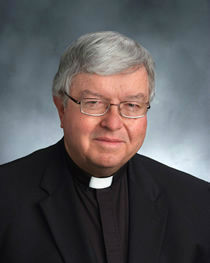
Faith
In order for you to marry in a Catholic ceremony, two things would have to happen. You yourself would have to meet with a priest and complete some very simple paperwork regarding your first marriage.

Doyle
Q. I am a Catholic and single father of two. I was not married Catholic originally and was divorced 20 years ago. I am looking to marry a woman who was married in a Catholic ceremony and divorced 20 years ago because of abuse. The paperwork required for her to obtain an annulment in her home country of Venezuela is almost impossible.
If I marry her without an annulment, would that ruin my chances to be an extraordinary minister of holy Communion and to receive holy Communion? (Tampa, Florida)
A. In order for you to marry in a Catholic ceremony, two things would have to happen. You yourself would have to meet with a priest and complete some very simple paperwork regarding your first marriage. That paperwork would then be submitted to the diocesan marriage tribunal, which would then declare that this marriage "did not count" in the Church since you were not married in a Catholic ceremony or with Catholic permission.
As for the woman you seek to marry, her situation is more complicated. Since she was married in a Catholic ceremony, she would have to go through the Church's annulment process to have that first marriage declared invalid. (That she suffered spousal abuse would be an important factor because it might show that her first husband, from the start, was ill-equipped to marry.)
She need not seek this church annulment in the country of Venezuela; canonically, a petitioner may file for a church annulment either in the place where the marriage took place (Venezuela, in this case) or where the petitioner now lives (which I am presuming to be Florida.)
Were you to marry her without these permissions, that marriage would not be recognized by the Catholic Church. Thus you would not be eligible to serve as an extraordinary minister of holy Communion or even to receive holy Communion, as noted in the Catechism of the Catholic Church (No. 1650).
Q. I have been an extraordinary minister of holy Communion for about 20 years. During that time, I have dropped the host twice while distributing Communion. I was embarrassed and mortified -- to the point where I have even considered no longer giving Communion. What is the proper thing to do if the host is dropped? (This has bothered me for a long time, and I hope that you will provide an answer.) (northern Missouri)
A. There is no need to be mortified -- or even embarrassed. As much as we try to treat the Eucharist with the utmost reverence, accidents do occur. I have distributed holy Communion for more than 50 years, but just last week I dropped a host on the floor when two hosts stuck together.
The General Instruction of the Roman Missal, which is the church's guidebook on liturgy, says this: "If a host or any particle should fall, it is to be picked up reverently; and if any of the precious blood is spilled, the area where the spill occurred should be washed with water, and this water should then be poured into the sacrarium in the sacristy" (No. 280). The sacrarium is a special sink that drains directly to the ground.
So if you happen to drop a host, pick it up carefully and either consume it or dissolve it later on in water (so that it no longer has the properties of bread) and wash it down the sacrarium. Treating the eucharistic species with reverence reflects the belief of the church that Jesus meant it when he said at the Last Supper, "This is my body ... this is my blood."
As the Catechism of the Catholic Church explains: "By the consecration of the bread and wine there takes place a change of the whole substance of the bread into the substance of the body of Christ our Lord and of the whole substance of the wine into the substance of his blood" (No. 1376).
(Accidents can be minimized if people receive the host the way they are instructed -- in the outstretched and open palm -- rather than grabbing for it, as they would for a brass ring on a merry-go-round.)
- Father Kenneth Doyle is a columnist for Catholic News Service
Recent articles in the Faith & Family section
-
Scripture Reflection for April 21, 2024, Fourth Sunday of EasterJem Sullivan
-
The new Temple: How Easter changes religionDr. R. Jared Staudt
-
The wonder of Ordinary TimeLucia A. Silecchia
-
Is there still responsibility for past sins after confession?Jenna Marie Cooper
-
Wounds, not scarsJaymie Stuart Wolfe


















